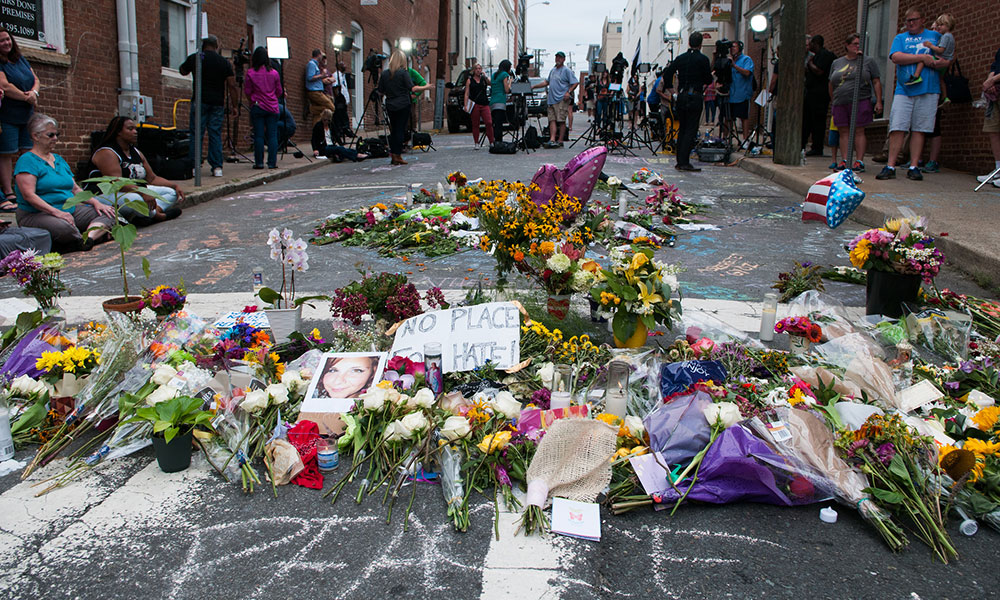
How a Charlottesville Association Responded to the Alt-Right March
In advance of last weekend’s “Unite the Right” rally, which ultimately turned violent, the Downtown Business Association of Charlottesville helped businesses stay open and connected. Now it has more members—and more work to do.
Jane Fenton, chair of the Downtown Business Association of Charlottesville (DBAC), knew something big would be coming to the Virginia college town last weekend. The frustrating part was not knowing exactly what, or how big it would become.
The basics weren’t in question. On August 12, white nationalists, neo-Nazis, and other separatist groups, all broadly defined as the “alt-right,” were planning to converge on the town. Specifically, they’d be there to protest the planned removal of a statue of Confederate general Robert E. Lee; more broadly, they wanted to put a public face on alt-right ideology. But Fenton, the owner of a downtown gallery and boutique, knew from experience that clarity would be hard to come by on questions of how the city and police would interact with businesses ahead of the gathering.
You go, ‘I’m going to do this, because if this a ghost town, it makes it that much worse.’
Last month, for instance, the city closed downtown streets in response to a smaller Ku Klux Klan march, a decision businesses felt had been sprung on them, Fenton says. “We got no communication…. After that, I was determined that we would establish clear lines of communication with the city.”
In late July, DBAC pressed for a meeting with police and the city manager and asked for regular updates as the event approached. Authorities promised to keep businesses in the loop, Fenton says, but given the ever-changing plans for the rally, they couldn’t make hard promises.
So DBAC took its own initiative, joining a group of business that delivered a letter to the Charlottesville police chief asking for strong security measures that would allow businesses to remain open.
“We can ill afford to lose a day’s business during our peak season,” the letter [PDF] read in part. “Doing so could be the difference between profit and a loss for the month. It would also mean that rally attendees will find it difficult to find a place to use a toilet, cool down, or buy food or water.”
A poster displayed on many businesses in Charlottesville this weekend. (bored_grrl/Flickr)
Fenton also directed DBAC members to an email thread, and later a Slack discussion, where local businesses coordinated what services they would provide and whether they would remain open. Another group, Unity C’ville, helped produce and distribute posters that let businesses announce their disapproval of the alt-right protesters, regardless of whether their doors were closed or open.
As a result, Fenton says, 60 of 80 stores affiliated with the DBAC stayed open on August 12. About half of those closed early, either by plan or in response to the incident in which one far-right protester drove into a crowd of anti-racism marchers, killing a woman. Gov. Terry McAuliffe declared a state of emergency in the city shortly after the incident.
“We had vowed to come in Saturday, and I’m thinking, am I doing this, am I not doing this?” Fenton says. “Then you go, ‘I’m going to do this, because if this a ghost town, it makes it that much worse.’ People don’t have a safe place to go, it allows for violence against the town.”
Throughout last weekend, Fenton maintained a list of what business owners were doing. She shared that information with authorities and others who needed a clearer picture of the situation downtown—or who simply wanted to know where the available safe havens were that day.
Fenton takes a few lessons from the experience. First, she says, DBAC found common cause with the area’s bars and restaurants, many of which are separate from the association’s core membership of retailers.
Second, she says, it was able to demonstrate DBAC’s value as an organization that put a positive face on a city in an unsolicited media spotlight and that provides a force for advocacy in the community. Fenton says the association has gained 15 new members in recent weeks as a result of the preparations for the rally. At its board meeting Wednesday, “a lot of people purposefully brought their [dues] checks,” she says.
DBAC plans to launch two new committees in response to the alt-right events. One will work on continuing to establish connections between the business community and city authorities. The other will focus on marketing that supports a positive image of a community that experienced a weekend of ugly ideology and tragic violence.
“I didn’t think that [the board meeting] was a place to have a rehash of what’s happened. It’s very raw,” she says. “It’s like any community. You have an earthquake, a hurricane, and after something like that happens, people pull together. So my goal was, how can people pull together here?”
A makeshift memorial at the site of the deadly attack that killed Heather Heyer on Saturday. (Bob Mical/Flickr)







Comments